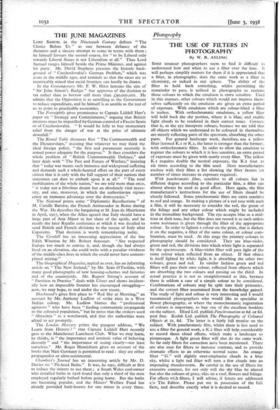THE JUNE MAGAZINES
LORD SAMUEL in the Nineteenth Century defines " The Choice Before Us " as one between defiance of the dictators and a sincere attempt to tome to terms with them ; he himself favours the second course, for " to be Liberal only towards Liberal States is not Liberalism at all." Thus Lord Samuel ranges himself beside the Prime Minister, and against his party. Mr. David Stephens presents the historic back- ground of " Czechoslovakia's German Problem," which was acute in the middle ages, and reminds us that the races are so inextricably mixed that racial frontiers can hardly be drawn.
In the Contemporary Mr. F. W. Hirst laments the size of " Sir John Simon's Budget " but approves of the decision to tax rather than to borrow still more than £9o,000,000. He
admits that the Opposition is as unwilling as the Government to reduce expenditure, and he himself is as unable as the rest of us to point to practicable economies.
The Fortnightly gives prominence to Captain Liddell Hart's paper on " Strategy and Commitments," arguing that British interests must be imperilled by German control of a Fascist Spain or of Czechoslovakia. " It would be folly to buy momentary relief from the danger of war at the price of ultimate downfall."
The Round Table discusses first " The Commonwealth and the Dictatorships," insisting that whatever we may think the ideal foreign policy, " the first and paramount necessity is armed power adequate for the purpose." It then considers the whole problem of " British Commonwealth Defence," and later deals with " The Past and Future of Warfare," insisting that " today war means such immense and widespread suffering and demands such a whole-hearted effort on the part of every citizen that it is only with the full support of their nations that statesmen can dare to embark upon it at all." "The total mobilisation of the whole nation," we are told more than once, " is today not a frivolous dream but an absolutely vital neces- sity, and one, moreover, in which the authoritarian regimes enjoy an immense advantage over the democracies."
The National prints some " Diplomatic Recollections " of M. Camille Barrere, the French Ambassador in Rome during the War. He describes the bargaining at St. Jean de Maurienne in April, 1917, when the Allies agreed that Italy should have a large part of Asia Minor as her share of the spoils, and he recalls the later Rapallo conference at which it was decided to send British and French divisions to the rescue of Italy after Caporetto. That decision is worth remembering today.
The Cornhill has an interesting appreciation of the late Edith Wharton by Mr. Robert Sencourt. " She respected Eufope too much to satirise it, and, though she had always lived on an elevation, she could write with a peculiar vividness of the middle-class lives in which she could never have contem- plated mixing."
The Geographical Magazine, topical as ever, has an informing article on " The New Ireland," by Mr. Sean O'Faolain, with many good photographs of new housing-schemes and factories and of the countryside. Mr. Rupert Strong's account of " Partition in Practice " deals with Ulster and shows incident- ally how an impossible frontier has encouraged smuggling— now, we may hope, to end under the new treaty.
Blackwood's gives first place to " Red Sky at Morning," an account by Mr. Anthony Ludlow of strike riots in a West Indian colony. Mr. Ludlow blames the " professional agitators " who have been " feeding communistic propaganda to the coloured population," but he notes that the strikers used " Abyssinia " as a watchword, and that the authorities were afraid to act promptly.
The London Mercury prints the pungent address, " We Learn from History ? " that Captain Liddell Hart recently gave to the Manchester Luncheon Club. What we may learn, he thinks, is " the importance and intrinsic value of behaving decently " and " the importance of seeing clearly—not least ourselves." Mr. Roger Henrichsen gives an account of the books that Nazi Germany is permitted to read : they are either propagandist or ultra-sentimental.
Chambers's Journal has an interesting article by Mr. D. Davies on " Pit-head Baths." It was, he says, difficult at first to induce the miners to use them ; a South Wales coal-owner who installed baths in 1916 found that only a third of the men employed regularly bathed before going home. But the baths are becoming popular, and the Miners' Welfare Fund has already provided bath-houses for one miner in every three.


















































 Previous page
Previous page